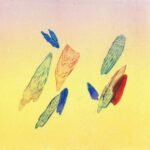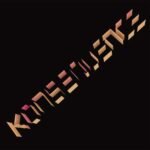My first introduction was AERI‘s 2021 self-titled EP. She went quiet until a single in 2022 and then singles before her next EP, Shelter Tide. Now Shelter Tide is publicly available and I was able to send some questions over to her about the album, identity, and creating a message through music.
Can you introduce yourself?
Hi I’m AERI, a singer & songwriter based in Brooklyn.
Considering your first EP, AERI, released in 2021, and your second, Shelter Tide, arrives in 2024, what are the major differences between these two releases?
I think this EP is more grown up than my first, reflecting both the maturity of me as a person and an artist. The role music plays in my life hasn’t changed – a vehicle to move through grief, love, and longing, but as I wrote Shelter Tide from 2020-2022, the immense reckoning of those years had me going deeper and wider.
Not only is Shelter Tide an archive of my internal world, but a mirror of the external world as well.
AERI felt like a snapshot of the time when independent Asian American were influenced by other popular Asian artists while adding their own voices. But Shelter Tide sounds less “produced” and “polished” with a more organic and individual presentation. Do you feel like you’ve found your own signature in your music?
I don’t think I’ve “found” my signature in music, as it feels like something that I will continue to unearth and iterate on, but I do think with each time I create, with more wisdom and life experiences, I step into what feels authentic to me.
A lot of that for me does come from tapping into the rawest, unpolished parts of myself—almost like capturing a stream of consciousness or the ugly etchings of my mind.
Regarding identity, your bio says, “AERI (she/they) is a queer, Korean-American singer-songwriter…” Do you, as an artist, feel it’s an unnecessary weight that you carry that overshadows your music? Like instead of focusing on your music, it always starts with an outlier description of how you’re not the “standard?”
No, I don’t think my identities overshadow my music. I believe that who I am as an individual, how I see and move through the world, is integral to what I have to say.
Sometimes I do feel like there’s potential to be put in a box with certain labels, “queer music” for example, but I don’t let that limit what I create or embody.
How did these songs come together? Were they collected demos or were they all new compositions that came from the work you did with the various producers?
It all happened one song at a time. Thus far my process has been very organic, turning to an instrument or the page whenever something brews up and trusting that all will be revealed in time.
There were moments when I had no idea what all these songs had to do with one another, yet years later, its unifying theme unveiled itself: mental and systemic cycles and the longing for safety outside of them.
“Wounded Girl,” “okay, okay,” and “For Always, Our Way” are three songs using three distinct separate genres, but they all sound connected. Was there a plan for the EP before you started recording to make a wide selection of songs?
Nothing was pre-planned or mapped out in the writing process, but I do think the range of genres and styles reflect the different dimensions of who I am and what I was going through.
I don’t really align with the idea of having a particular artist sound or genre – I am a multidimensional person with many different, even contradictory sides of me – why shouldn’t my music be the same?
In terms of where you are now, who did you make this album for? Is it a release for yourself or is it for who you were years ago? Or even, is Shelter Tide for that person who feels alone and unseen?
I made it for myself mostly as a way to process feelings that often felt too big to metabolize: anxiety, panic, grief, languishing, safety. I made it as a lil refuge for myself in the midst of it all and I share it as an offering for anyone else who can find solace in these songs.
Is there a song on Shelter Tide that you feel is your signature now? Or do all songs share different pieces of your artist vision?
I think taking it in as one whole composition encompasses my voice and vision. It’s like a chapter of a book, no one chapter represents the whole book.
Any dream collaborations?
It’s a dream to continue to work with fellow local musicians with shared intentions. It’d be an honor to collaborate with more culture workers in New York, as well as a Korean artist from another part of the world to make a trans-continental diasporic piece.
Anything to say to readers?
Thank you for reading this and I hope you feel held in these songs. I’d love to hear from you if this work moves you.
And please, if you aren’t already, make art, make music, whatever heals and delights you.
Instagram | SoundCloud | Official Website | YouTube | Bandcamp | Apple Music | Spotify | YouTube Music
Written by Chris P for Korean Indie.














